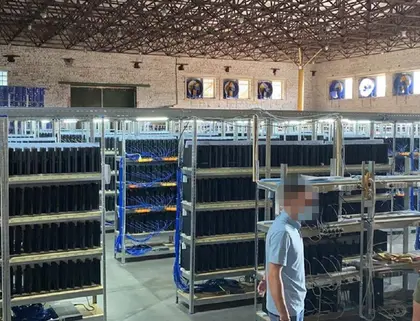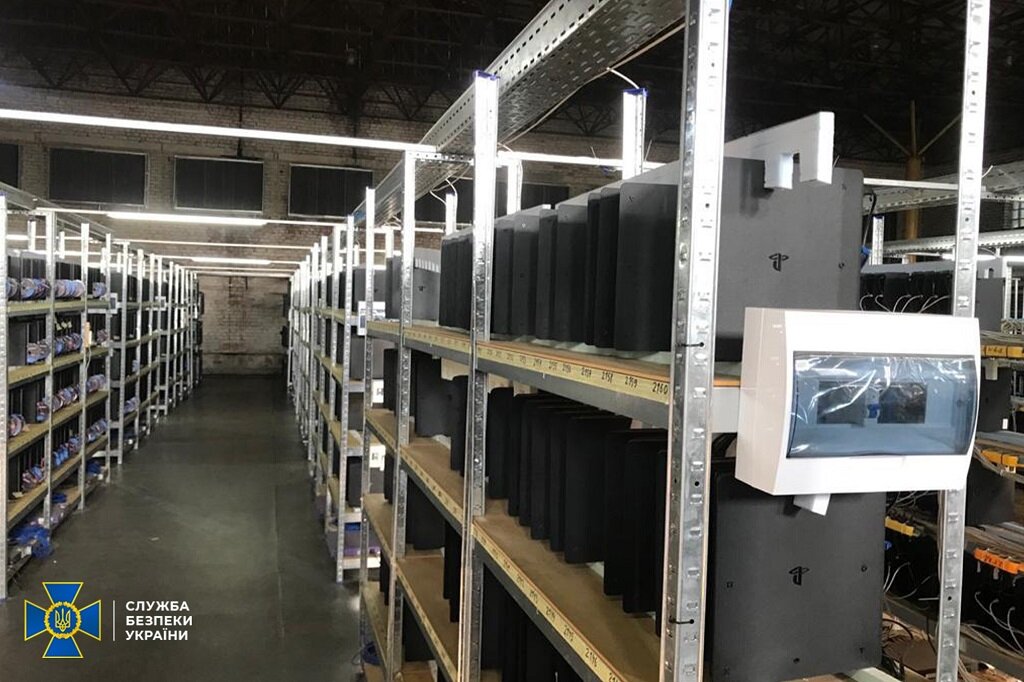Editor’s note: the story has been updated to include the report from Ukraine’s energy regulator about the unjustified energy consumption by Vinnytsiaoblenergo.
Ukraine’s Security Service reported on July 8 that it exposed a crypto mining farm that allegedly stole electricity from a regional energy distributor in Vinnytsia, a city of almost 400,000 people 270 kilometers southwest of Kyiv.
According to the Security Service (SBU), thieves illegally mined cryptocurrency in a warehouse adjacent to the facilities of Vinnytsiaoblenergo, an energy distribution company. They used over 5,000 computer devices, including Sony PlayStation 4 consoles and graphics cards piled up from the floor to ceiling in metal racks.
Although crypto mining farms are usually associated with computers, gaming consoles are cheaper and have powerful graphics cards that crypto specialists use to mine cryptocurrency, crack passwords, and process movies or images, cryptocurrency expert Michael Chobanian said.
According to the SBU, it is one of the largest illegal crypto mining farms uncovered by Ukrainian law enforcement. However, “it is a drop in the bucket” compared to other farms that potentially exist in Ukraine, Chobanian told the Kyiv Post. The more computers the farm operates, the higher its yield, he said.
According to SBU estimates, the crypto miners stole stole nearly $259,000 worth of electricity from Vinnytsiaoblenergo. The illegal activities could have led the city to suffer power shortages, the SBU said.
To conceal the theft, the crypto miners used electricity meters that did not reflect their actual energy consumption, the SBU said. Law enforcement is now trying to identify all suspects and check whether the company’s officials were involved.
In a statement published on July 9, Vinnytsiaoblenergo said that it has nothing to do with any illegal activity of crypto miners: “The equipment used for cryptocurrency mining has never operated on premises owned by our enterprise.”
Vinnytsiaoblenergo also said it has found no evidence of electric theft and concluded that SBU’s information “does not correspond to reality.”
“We will not make excuses. Let the SBU figure out what has happened,” Vinnytsiaoblenergo’s press service told the Kyiv Post on July 12. The SBU didn’t respond to the request for comment as of the time of the publication.
Ukraine’s energy regulator (NERC) reported on July 12 that Vinnytsiaoblenergo artificially ramped up the volume of electricity consumption to increase tariffs. In 2018 and 2019, for example, it consumed 35% more energy than in 2017. NERC also confirmed that due to the activity of crypto mining farm Vinnytsiaoblenergo could have cost nearly $259,000 – this number is proportional with the amount of unjustified electricity consumption.
Vinnytsiaoblenergo belongs to Ukrainian businessman Konstantin Grigorishin and investment firm ICU. Grigorishin shares some of its energy assets with Ukrainian oligarch Igor Kolomoysky. He is worth $275 million, according to Forbes.
The crypto industry in Ukraine is paradoxical. Although it is unregulated and Ukrainians cannot register as crypto entrepreneurs or declare cryptocurrency exchanges, it is completely legal to mine and trade cryptocurrencies here.
Experts said that there are two ways to look at crypto miners in Ukraine: as victims suffering from usually unsubstantiated raids of law enforcement or as criminals who import tech for crypto mining illegally and avoid taxation.
The SBU often abuses its power and seizes valuable equipment worth thousands of dollars without legal justification, said Nataliya Drik, CEO of organization Blockchain Ukraine. The country doesn’t have a state register of data centers used for crypto mining, thus many specialists work in shadow or move abroad to avoid raids. “It also prevents the flow of foreign investment into the country,” Drik said.
There are also miners and traders of cryptocurrencies who consider Ukraine as a haven for their activity due to the lack of taxation and regulation.
To deal with both legal and illegal cryptocurrency entrepreneurs Ukraine is working on laws to tame the industry. For example, lawmakers have already passed in the first reading a law on virtual assets. It defines the legal status of the virtual assets, basic rules and demands for providers of services with virtual assets. The Ministry of Digital Transformation also plans to make amendments to the Tax Code and set the income tax rate at 5% for crypto businesses.
Ukraine also plans to build cryptocurrency mining data centers next to nuclear power plants. Experts said that these data centers could help the country solve the problem of inefficient energy spending and bring money to the state budget.
The government expects to complete the project by 2023 but it may take longer: “All these efforts could be fruitless because of the corruption,” according to Chobanian.
You can also highlight the text and press Ctrl + Enter





